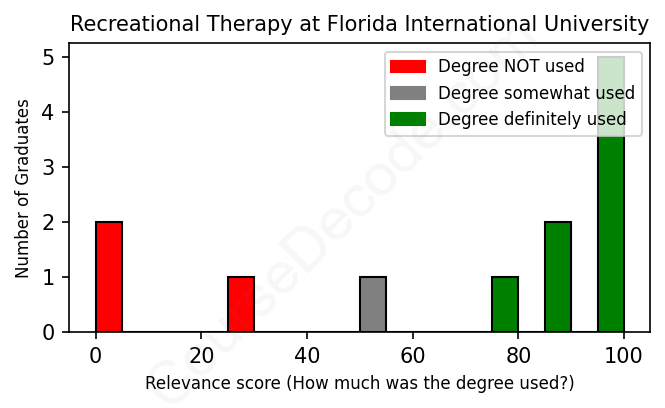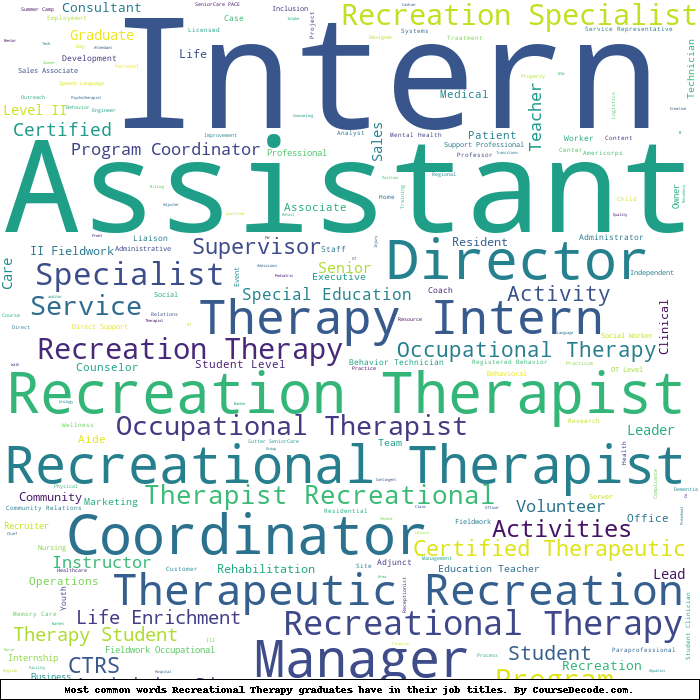
First, some facts. Of the Recreational Therapy graduates from Florida International University we've analyzed , here's how many have used (or NOT used) their degree in their career:

These are estimates based on AI analysis of 12 LinkedIn profiles (see below).
The verdict? Slightly above average. Overall, with an average relevance score of 69%, Recreational Therapy graduates from Florida International University have a slightly higher likelihood (+2%) of finding work in this field compared to the average graduate across all fields:
And for comparison, here's the chart for all profiles we've looked at across all degrees.
Also, after graduating, only 25% of these graduates have pursued further education other than another Bachelor's degree (such as a Masters degree or other), compared to the average across all profiles of 35%. This suggests a Bachelors degree is enough for most Recreational Therapy graduates, and it's normal to look for work straight after graduation.
See the details:
|
Relevance score: 0% We think this person has NOT gone into a career related to their degree. We think this person has NOT gone into a career related to their degree.
DEGREE INFOGraduated in 2021 from Florida International University with a Bachelor's degree in Recreational Therapy. No other secondary education since. JOB HISTORY SINCE GRADUATIONOffice Administrator Haller Robbins Epelbaum Misiunas LLC Sep 2021 - Present ABOUTNo information provided. |
The top 10 most common jobs done by the graduates we've analyzed (ranked most common to least) are:
Based on the profiles analyzed, it seems like many graduates from Florida International University's Recreational Therapy program have landed roles that are directly related to their field, particularly in therapeutic and recreational settings like hospitals, veteran affairs, and rehabilitation centers. Positions such as Recreational Therapist and Activities Director show a strong connection to the principles of recreational therapy, where they utilize their education effectively to enhance clients' well-being. Internships at places like Baptist Health and Miami Jewish Health Systems also reflect a solid foundation in practical therapy work, which is a crucial aspect of their training.
However, not all jobs seem to align closely with the degree. Some alumni took on roles outside the therapeutic realm, like managerial positions or administrative jobs, which don't fully utilize recreational therapy skills. Positions like Office Administrator or Chief Revenue Officer illustrate a significant shift away from therapy-related responsibilities. While a couple of roles, such as Case Manager, still apply therapeutic principles, many graduates ventured into jobs where their degree didn't play a pivotal role. Overall, while there is a commendable number of graduates in relevant therapeutic roles, a noticeable portion has pursued careers that don't directly engage with their education in Recreational Therapy.
Here is a visual representation of the most common words in job titles for Recreational Therapy graduates (this is across all Recreational Therapy graduates we've analyzed, not just those who went to Florida International University):

Looking at the career paths of Florida International University graduates with degrees in Recreational Therapy, you can see a pretty diverse set of trajectories. Many of them kick off their careers with internships or assistant positions in recreational therapy settings, like working as a Recreational Therapist Assistant at the U.S. Department of Veterans Affairs or doing internships at various health systems. It’s a good sign that their first jobs are often directly related to their field, which is great for gaining relevant experience straight out of college.
As you look further down the line, like five to ten years later, there’s a mix of success. Some have continued to build on their experience in roles that align closely with recreational therapy, like activities directors in senior living facilities or social services positions. However, there are also a few who seem to have drifted into unrelated areas after gaining some experience, like management roles in non-therapy-related businesses. Overall, while many graduates stick to careers in therapeutic settings, there’s also a notable portion who explore different paths, indicating there’s some flexibility in how their degrees can be applied, even if it doesn’t always keep them in recreational therapy. So, it’s really a mixed bag depending on individual choices and opportunities that arise after graduation!
Getting a Bachelor’s degree in Recreational Therapy can definitely be a manageable challenge, especially at a school like Florida International University, which has a solid program. While you’ll find some tough classes, particularly in areas like anatomy, psychology, and therapy techniques, many students find it to be a good balance of practical and theoretical learning. It’s not a walk in the park, but it’s also not as stressful as some of the more rigorous STEM fields. If you’re passionate about helping people and enjoy hands-on activities, you might actually find it quite enjoyable! Just be prepared to put in some effort, especially for projects and internships, but overall it tends to be a reasonable course of study.
Most commonly, in the LinkedIn profiles we've looked at, it takes people 2 years to finish a Bachelor degree in Recreational Therapy.
Looking at the job history of these FIU Recreational Therapy grads, it seems like their financial situations vary quite a bit. Some, like the ones who stepped into roles at the U.S. Department of Veterans Affairs or took on director positions, likely make decent money given the stability and nature of those jobs. However, others have spent a lot of time in intern or entry-level positions, which usually means lower pay, especially right after graduation. The recent grads seem to have a mix of roles, with a few aiming for advanced degrees or moving into higher-paying positions, which is promising for their future earnings. Overall, it looks like a mixed bag; some are doing well, while others are still on the grind to rise up in their careers.
Here is a visual representation of the most common words seen in the "about" section of LinkedIn profiles who have a Bachelor degree in Recreational Therapy (this is across all Recreational Therapy graduates we've analyzed, not just those who went to Florida International University). This may or may not be useful:

Here are all colleges offering a Bachelor degree in Recreational Therapy (ordered by the average relevance score of their Recreational Therapy graduates, best to worst) where we have analyzed at least 10 of their graduates:
| College | Score | Count |
|---|---|---|
 Indiana University Bloomington Indiana University Bloomington
|
80 | 11 |
 East Carolina University East Carolina University
|
75 | 13 |
 Florida International University Florida International University
|
69 | 12 |
 Central Michigan University Central Michigan University
|
61 | 10 |